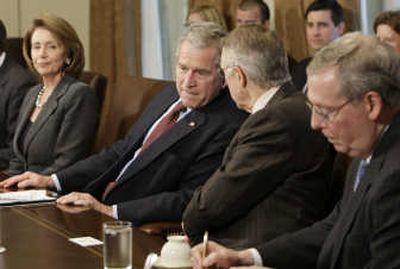Stimulus gains steam

WASHINGTON – Spooked by stumbling stock markets around the world, Bush administration officials and members of Congress accelerated the pace of negotiations over a $150 billion economic rescue bill Tuesday, saying they intended to pass it before Feb. 15.
That could put rebate checks into the hands of taxpayers by late spring.
“The attitude that we ought to get something done soon prevails on both sides,” said the Senate’s No. 1 Republican, Minority Leader Mitch McConnell of Kentucky. “Our definition of ‘soon,’ obviously, is in the next few weeks. That, by the standards in Congress, is pretty fast.”
The Federal Reserve, dispensing with caution and ordering a steep interest rate cut, succeeded Tuesday in curbing an incipient panic in global stock markets, but new pressures on the troubled financial system seem likely to appear.
And interest rate cuts, which the Fed signaled its willingness to carry further in the weeks ahead, address some but not all the sources of trouble in the economy both here and abroad.
The three-quarters-of-a-point cut to 3.5 percent in the federal funds rate – the largest one-time reduction in almost two decades – helped avert an immediate crisis in the U.S stock market, where the bellwether Dow Jones industrial average tumbled more than 464 points but rallied to end the day down 128.11 points.
The Fed’s action, which slashed the interest rate banks charge each other for short-term loans, had an even more positive effect in Europe: Falling markets reversed course and closed up for the day on Tuesday.
Most Asian markets rebounded strongly today, reversing their recent gut-wrenching plunge as investors welcomed the surprise interest rate cut by the U.S. Federal Reserve.
But analysts said volatile swings were expected to linger in regional trading for some time because the Fed’s quick action, at an emergency meeting, was seen by some traders as a sign American authorities view the U.S. credit crunch as a very serious problem.
“The Fed’s action provided a very positive surprise,” said Tsuyoshi Segawa, strategist at Shinko Securities Co. in Tokyo. “But people are also starting to think that things may be so bad they needed to act.”
In Washington, the goal is to pass the legislation, a mix of tax rebates and other measures aimed at jolting the economy with an infusion of consumer spending and business investment, before Congress adjourns for the Presidents’ Day break.
Negotiators wouldn’t discuss details of the plan but expressed confidence that for the first time since Democrats took control of Congress a year ago, both parties and two branches of government would be able to come together on a compromise to limit the damage of an economic downturn.
“All of us understand that we need to work together. All of us understand that we need to do something that will be effective. And all of us understand that now is the time to work together to get a package done,” President Bush said after meeting with congressional leaders at the White House.
White House officials said the president hadn’t rejected out of hand the idea of making the stimulus package larger than the $150 billion that has recently been discussed.
Hill leaders said they wanted to fast-track the legislation by having House Speaker Nancy Pelosi, D-Calif., and Minority Leader John A. Boehner, R-Ohio, negotiate the provisions personally with Treasury Secretary Henry M. Paulson.
And Pelosi is expected to seek the agreement of committee chairmen to move the bill directly to the House floor.
On the Senate side, leaders are banking on momentum from the bill’s probable success in the House to help speed it through the closely divided chamber.
Despite the chorus of accord at the leadership level, occasional notes of discord were sounded within the ranks. In a speech on the Senate floor, Sen. Judd Gregg of New Hampshire, the top Republican on the budget committee, expressed doubt that the tax rebates would stimulate the economy as much as Democrats promise.
“The money will be spent, but does it stimulate our economy?” Gregg said. “So much of our product today that we consume in America today is produced outside the United States – maybe it stimulates the Chinese economy?”
He added that the cost of the stimulus would be added to the national debt, effectively passing on that sum plus interest to the next generation.
“That money is borrowed from our children,” Gregg said. “And then our children and our children’s children have to pay it back. So, do you get the value? Is there a value there large enough to justify putting this debt on our children’s back?”
Sen. Edward M. Kennedy, D-Mass., chairman of the labor committee, contended that the tax incentives for business investment favored by Republicans “do not provide an effective stimulus.”
Economists, similarly, remained deeply divided on whether the Federal Reserve’s action would have a lasting impact on the combination of problems dogging the nation: the subprime mortagage crisis, the fall in housing prices, and growing liquidity problems among some of the nation’s largest banks and other financial institutions.
Said Stephen Roach, chairman of Morgan Stanley Asia: “I do not believe that aggressive Fed rate cuts will resolve the extreme imbalance between supply and demand in the U.S. property market … nor restore the functioning of the credit markets to their pre-crisis state.”